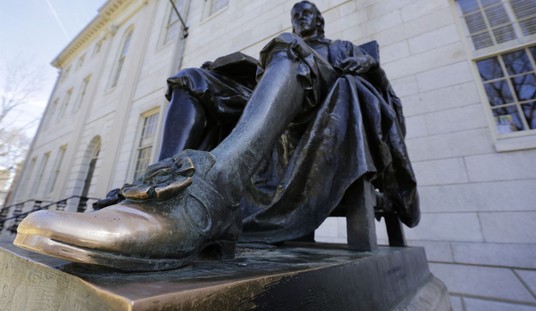U.S. District Court Judge James Boasberg imposed a sentence of one year of probation on Kevin Clinesmth today in connection with his guilty plea to making a “false writing” during the course of his work as an attorney for the FBI on the Crossfire Hurrican investigation at the time it was being run by the Mueller Special Counsel’s Office.
I telegraphed a bit in this story from a few months ago that Special Prosecutor John Durham wasn’t approaching Clinesmith’s sentencing as the first of many dominos that might fall. But that doesn’t mean that Clinesmith was not valuable as a witness who could be extensively debriefed about both Crossfire Hurricane and the Mueller Special Counsel’s Office.
To recap briefly, Clinesmith was an attorney — not a prosecutor — who worked to provide legal support and assistance to the FBI Agents and analysts working on Crossfire Hurricane. He was with the investigation from the very start and continued on the investigation after it was taken over by Mueller’s team.
In that time frame, June 2017, preparation was underway to seek a third renewal — for another 90 days — of the FISA electronic surveillance warrant obtained on Carter Page. The original warrant was obtained on October 22, 2016, and it had been renewed twice prior to June 2017.
In March 2017 Page’s name was leaked to the media as a former Trump campaign official who was suspected of being a Russian Agent, and that he had been under secret surveillance by the FBI for many months.
In April 2017, Page himself went public doing interviews in which he denied that he was a Russian agent, and stated that he had been acting as a source of information for the CIA for many years.
In response, a new FBI supervisor working on the Crossfire Hurricane team wanted to reconfirm the information in the original Application and first two renewals with respect to Page’s status as a source for the CIA. He tasked Clinesmith with contacting the CIA, and finding out whether Page’s public comments were accurate or not.
Clinesmith made contact with his CIA liaison and received an email in response. He then communicated to the Supervisor that the CIA had confirmed Page was not a source. The Supervisor asked if Clinesmith got that “in writing.” Clinesmith confirmed that he had.
But the email Clinesmith had did not say Page was not a source. It did describe Page’s prior history with the CIA, and that this information had been sent to the FBI in a package of materials in August 2016. Clinesmith copied the text of the email from the CIA liaison into a new email message to go to the Supervisor but added four words “is not a source” to make the email expressly definitive in ways that the original email was not.
Clinesmith either purposely or negligently misinterpreted the original email from the CIA when he first communicated the information to the Supervisor. After looking at it again, and knowing he had confirmed he had the information “in writing”, he altered the email to make it say expressly what he had communicated to the Supervisor.
But that was not accurate. As Page had claimed publicly, he had been providing information to the CIA about his contacts with ostensible Russian businessmen who Page and the CIA knew were actually Russian intelligence officers and assets engaged in various forms of espionage and intelligence gathering activities in the United States. Has the FBI truthfully communicated this information to DOJ attorneys who had to approve the FISA application — or to the FISA Court — the applications would never have been authorized or approved. The only reason for issuing the warrant on Page was the claim he was a Russian agent. But if he was reporting his contacts with the Russians to the CIA in real-time as they were taking place, that would be inconsistent with the claim in the FISA application that he was a Russian Agent.
The Inspector General’s investigation into the Page FISA matter uncovered the two versions of the email — one that Clinesmith received from the CIA and the one Clinesmith sent to the FBI Supervisor who asked for it. Special Counsel John Durham opened a criminal investigation based on the Inspector General’s report, and that led to Clinesmith being charged and pleading guilty to one count of creating a “false document.”
Here are a few things to understand about the sentencing today.
First, the “range” of recommended sentences under the U.S. Sentencing Guidelines was 0-6 months. In other words, this crime is among the category of the least serious federal felonies that one can be charged with having committed. This was known at the time he was charged and pled guilty. This has always been the anticipated “range” that Judge Boasberg would be considering.
Second, the circumstances surrounding the crime are something a sentencing judge can take note of as an “aggravating” or “mitigating” factor, but in almost all instances that only influences where within the range the judge opts to impose a sentence — it does not increase the sentence above it the range (it can but those are rare cases).
Third, in my experience over the course of hundreds of sentencings, liberal judges appointed by Democrat Presidents tend to begin the sentencing process by default at the “bottom” of the guideline range and go “up” from there is warranted by the circumstances of the case.
More conservative judges tend to begin the sentencing process in the middle of the guideline range, and go up or down from there depending on the circumstances of the case.
Judge Boasberg is an Obama appointee, and I assumed from the little I knew about him that he would begin with a presumption of 0 months in custody — meaning a sentence of probation.
Fourth, in most federal districts, any sentence less than 12 months is served by the defendant as “local” time. That means the defendant is not designated to some Bureau of Prisons facility in some other location but instead will serve his sentence at the Detention Center located in proximity to the Courthouse where pretrial detainees are held after they are charged but before they go to trial.
All federal judges in the district are always up to date on the conditions and capacity of the local detention center. Space and capacity issues have a big impact on their ability to house defendants who they want to keep in custody for safety or flight reasons. Magistrate judges who do most of the detention hearings where the decision is made to release or detain a defendant pending trial are always mindful of capacity issues when making “close calls”.
Under the current COVID problems, many BOP facilities are operating at far lower than their maximum capacity in order to practice social distancing and prevent COVID infection problems to the greatest degree possible. Many more prisoners and defendants are being ordered to “home confinement” and electronic monitoring because of capacity issues.
So Judge Boasberg takes the bench today with a decision about the “pros” and “cons” of sentencing Clinesmith to serve 3-6 months in custody at the detention center as requested by the Special Counsel’s office — of which Clinesmith might serve half, maybe, before the Warden kicks him out for COVID reasons — or to simply pay heed to the “0” part of the “0-6” month range and simply impose a sentence of probation.
Everyone might object to the thought that these kinds of “practical” considerations drive “justice” decisions in America, but I’m telling you 100% these issues are factored in by Judges when you are talking about sentences in this range.
“What are the collateral ramifications of having this guy take up a bed at the detention center for 2 months?”
Who knows how many Jan. 6 rioters Boasberg has signed arrest warrants for that remain under seal. Maybe he’s expecting an influx of new arrestees over the next 30 days and he needs to keep bed space available.
What we do know — based on reports I’ve read online — is that Boasberg seemed sympathetic to Clinesmith’s claim that he believed his alterations to the document were factually accurate based on his understanding of the information from the CIA, and he did not alter it in a way that he knew made it factually inaccurate.
This was always the tricky part of this charge — Clinesmith didn’t need to make the “meaning” of the email false for it to be a “false document” under the statute — he only needed to make it different than the original in a “material” manner. Whether Page was or was not a CIA source was a “material” subject, and when Clinesmith changed the text he made the document “false” as compared to the original — not that the content was “false”, only that what he forwarded to the supervisor as an email from the CIA was no longer an email from the CIA because it had been changed by him.
If Boasberg bought this rationalization by Clinesmith for his conduct — and I think the Special Counsel was correct in arguing that other objective facts undermine this claim by Clinesmith — then the Judge was basically finding here wasn’t any real “malice” on Clinesmith’s part in making the change. Not surprising from a liberal sentencing judge — it’s just a matter of disposition in the way they do their job.
And it is accurate to say, as Clinesmith’s lawyer argued, that there are many many other errors in all four FISA applications that were the result of both negligent and intentional actions by other FBI Officials.
Clinesmith was NOT a significant “player” on the Crossfire Hurricane team. He had little or no operational authority — he wasn’t a decision-maker on anything. He was legal “support”. Prior to the Special Counsel’s Office taking over, the Crossfire Hurricane investigation was run by senior FBI Management officials. After the SCO took over it was run by high-profile DOJ Prosecutors and former prosecutors. Clinesmith’s “pay grade” was pretty far down the chain when you measure him against the others.
“Hanging” Clinesmith on this conviction was never in the cards. If anything it would have only looked worse when measured against the fact that no one else connected to Crossfire Hurricane’s decision-making has faced criminal charges (yet).
“Not hanging” Clinesmith is not proof that it’s all political and the fix was in.
I’ve seen this same outcome dozens of times, and politics had nothing to do with the outcome of the other cases. What Boasberg did today was very likely consistent with his general practice in sentencing these kinds of offenses.
You might think that “The FBI is corrupt”, and “The Deep State was out to destroy Trump”, and another number of other statements of outrage about what the Obama Justice Department did to the Trump campaign justified a harsh sentence for one of them.
But those factors don’t usually have much impact. They have an impact — but it’s much more meaningful when the person on the other end of the sentence is a James Comey or John Brennan — not a Kevin Clinesmith.
There’s always hope — right?















Join the conversation as a VIP Member